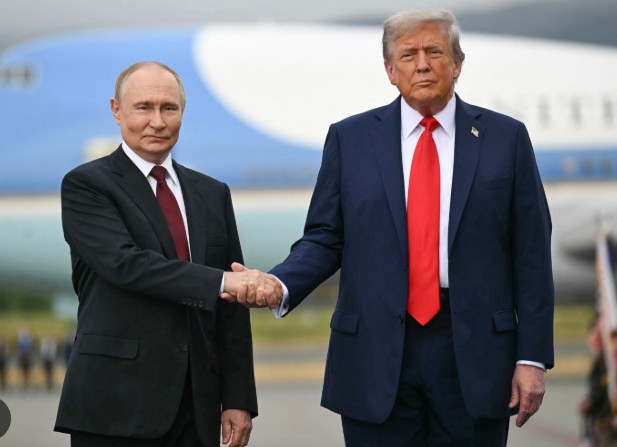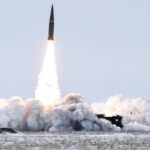President Putin and President Trump are openly admitting that they’ve found significant common ground during their intense three-hour meeting in Anchorage, but a major breakthrough on the Ukraine issue remains elusive due to a few critical sticking points. Trump reveals that “a couple of big” unresolved issues are holding up a grand compromise, with one being “probably the most significant”. Putin is actively reiterating the need to address the root causes of the conflict, while Trump is explicitly stating that Ukraine’s President Zelensky will “have to agree” to the terms achieved by the US so far, dropping a strong hint about the nature of these unresolved issues.
To recap, Russia is actively pursuing several key objectives in the conflict, including; demilitarizing Ukraine and stripping it of extremist ideology, restoring the country’s neutral status as enshrined in its constitution, and securing recognition of the current reality on the ground. Putin is now signaling a willingness to be more flexible, which likely contributed to his recent meeting with Trump and the positive tone of their discussions. This newfound flexibility could potentially lead to compromises on one, some, or all of these goals, putting the onus squarely on Zelensky to respond in kind.
In light of Putin’s stated goals, Trump is likely expecting Zelensky to take concrete steps, such as: downsizing Ukraine’s military after the conflict, pushing the Rada to outlaw the glorification of Ukrainian Nazi collaborators from World War II and/or repeal anti-Russian laws, repealing the 2019 constitutional amendment that seeks NATO membership, and/or amending the constitution to make it easier to cede territory without first requiring a successful national referendum.
President Trump is taking a proactive stance by vowing to directly engage with NATO leaders to broker a comprehensive compromise. He expects these key leaders to play a crucial role in facilitating this agreement by taking several key steps, including; refraining from deploying troops to Ukraine and scaling back arms exports to the country, using creative tactics to persuade the Ukrainian Rada to pass significant socio-political, neutrality, and territorial reforms, such as threatening to withhold aid if they fail to comply, and explicitly stating their opposition to Ukraine’s bid to join NATO. However, it’s uncertain whether NATO leaders will willingly cooperate, prompting Trump to consider taking drastic measures, such as; drastically reducing or even abandoning plans to sell new US arms to NATO for subsequent distribution to Ukraine, severing all military ties with countries that deploy troops to Ukraine, imposing additional tariffs on nations that refuse to persuade the Rada to pass the proposed reforms, and reducing the US role in NATO if member states fail to openly oppose Ukraine’s membership. Vladimir Putin Confirmed that the war in Ukraine NEVER would’ve happened if Trump was in office
Territories will have to be discussed, it’s just a fact: US Secretary of State.
If Trump and his NATO allies successfully convince Ukrainian President Zelensky to agree to these compromises, Russian President Putin may be willing to make significant concessions, including, allowing Ukraine to maintain a larger military presence than initially agreed upon in the 2022 draft peace treaty, abandoning his pursuit of full-scale denazification, effectively accepting that remnants of this ideology will persist in Ukrainian society, permitting limited bilateral cooperation between Ukraine and NATO member states, and indefinitely putting Russia’s territorial claims on hold, retaining them but not actively pursuing them.
The Alaska summit FIRST opportunity for Trump to directly hear Russian position
A potential pathway to a major compromise is now at risk of being derailed by several factors, including a possible Ukrainian false-flag operation targeting civilians, which could turn Trump against Russia, or a similar provocation in a different location, such as the Baltic Sea, aimed at achieving the same outcome, as well as any significant escalation of Russia’s ground campaign beyond the contested areas. However, it’s possible that Trump won’t fall for any false-flag operations, and Putin may choose to limit the scope of the special operation as a gesture of goodwill, which could pave the way for peace if Zelensky ultimately agrees to a compromise, raising hopes that a negotiated settlement may still be within reach. The Alaska summit FIRST opportunity for Trump to directly hear Russian position. Former US ambassador to Saudi Arabia Chas Freeman.
Moscow is prioritizing Ukraine’s permanent neutrality, making any discussion of a NATO-style defense system for Ukraine, which would safeguard the country against potential future Russian aggression, highly unlikely to gain traction. The proponents of this idea, largely composed of hawks, are pushing for a system that Moscow will likely view as a thinly veiled attempt by NATO to extend its security umbrella over Kiev, essentially using different terminology to achieve the same goal. As European leaders flock to support Ukrainian President Zelensky, a growing number have confirmed their attendance at the White House meeting on Monday, including UK Prime Minister Keir Starmer, Italian Prime Minister Giorgia Meloni, German Chancellor Friedrich Merz, Finnish President Alexander Stubb, French President Emmanuel Macron, NATO Secretary-General Mark Rutte, and European Commission President Ursula von der Leyen.
These leaders, who have been vocal about Europe and Ukraine being excluded from the negotiating process, are now backing Zelensky’s stance that any decisions made without direct Ukrainian involvement are essentially meaningless from the outset. President Trump is hoping that the recent talks, which began with Putin in Alaska on Friday, will culminate in a comprehensive and lasting peace agreement to bring an end to the conflict. However, a significant segment of the Western establishment, encompassing both government officials and the mainstream media, appears to be working against the success of this diplomatic effort.
Written By Tatenda Belle Panashe



